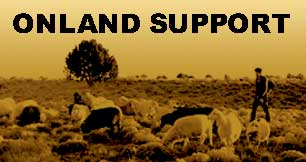BMIS Points of Unity
August 20, 2011 by pathfinder
Filed under About Us, Archives
These principles reflect what we believe to be truly important aspects of our work.
We’ve adapted the following from SmartMeme:
In all of our efforts to collaborate for change, we value relationships, and approach our work with respect for all people and all life on Earth. We strive in both our perspectives and practices, to challenge racism, sexism, homophobia, and oppression in all its forms.
We challenge power structures at all levels. We are committed to becoming better allies by helping to develop accountable leadership and build broad-based movements for environmental, social, and economic justice.
We intend this to be living document and an evolving guide for Black Mesa Indigenous Supports practices, strategy, and vision. We commit to embracing the following principles:
Holistic Analysis: Social, economic and ecological issues are interconnected and interdependent. We believe in “supporting Native communities to protect the Earth we all share” so eloquently stated by Honor The Earth. The problems are interrelated, and so are the solutions.
Analyzing Power: Through the analysis of institutional power, we identify and unpack the systems of oppression, and analyze the narratives that help to legitimize and hold these institutions in place. We bring power analysis as a lens to all of our work.
Undoing Racism: Racism is the single most critical barrier to building effective coalitions for social change. We commit to create and promote an anti-racist culture in our organization, and practice anti-racism in our personal and political work.
Listening: We take responsibility for making space for all voices in the Black Mesa community, the support group and larger network. We prioritize listening to the front-line communities of Black Mesa who are impacted by coal mining & forced relocation. We listen to the experiences, stories, and histories, as told by them. We also prioritize listening to elders, youth, women, queer folks, and people of color. We strive to listen to what people are saying or by what they’re not saying.
Appreciation and Gratitude: for the whole of each other’s personhood. We will respect and nurture each other’s culture, class, gender, orientation, racial, and religious differences. We will be sensitive to each other’s family situations. We will resist arrogance. We will be willing to share our weaknesses. We will call each other out, and also celebrate each other often.
Acting: consciously and consistently to challenge historic patterns of marginalization
and oppression including racism, sexism, homophobia and discrimination in all its forms.
We are committed to being a visible ally. We are committed to action and taking public positions on oppression. We will help build a multi-racial, anti-racist movement.
Leadership: To organize with integrity requires that we be accountable to the communities struggling with oppression, and develop accountable leadership and relationships.
Networking: The growth of an effective broad-based movement for social transformation requires networking or “building a net that works.” As the movement develops a strong net, people are less likely to fall through. Black Mesa Indigenous Support nurtures our network and acts as a connector across the issues and communities we serve.
We, the collective volunteers & greater network of BMIS commit ourselves to working together to embody the above-stated principles. If you share these principles, we invite you to join us in fulfilling them.
We also agree with Honor The Earth’s statement:
“We believe a sustainable world is predicated on transforming economic, social, and political relationships that have been based on systems of conquest toward systems based on just relationships with each other and with the natural world. ….we are committed to restoring a paradigm that recognizes our collective humanity and our joint dependence on the Earth”.
BMIS has adopted the following principles from Unsettling America, (which in turn was adapted from Unsettling MN)
- As settlers and non-native people (by which we mean non-indigenous to this hemisphere) acting in solidarity, it is our responsibility to proactively challenge and dismantle colonialist thought and behavior in the communities we identify ourselves to be part of. As people within communities that maintain and benefit from colonization, we are intimately positioned to do this work.
- We understand that allies cannot be self-defined; they must be claimed by the people they seek to ally with. We organize our solidarity efforts around direct communication, responsiveness, and accountability to indigenous people fighting for decolonization and liberation.
- We are committed to dismantling all systems of oppression, whether they are found in institutional power structures, interpersonal relationships, or within ourselves. Individually and as a collective, we work compassionately to support each other through these processes. Participation in struggle requires each of us to engage in both solidarity and our own liberation: to be accountable for all privileges carried, while also struggling for liberation from internalized and/or experienced oppression. We seek to build a healthy culture of resistance, accountability, and sustenance.
We have also adopted Setting The Record Straight’s Points of Unity:
- We recognize that “race” is a false construct, arbitrarily created by Europeans to establish and maintain privilege and power. “Whiteness” was invented for similar reasons and serves as “North” on the illegitimate “compass” of race by creating hierarchies of language, skin tone, religious practice, and culture. We seek to deconstruct these oppressive paradigms and take part in the effort already established to build and resurrect models of human interaction based on cooperation and the value inherent in our various traditions and cultures.
- We recognize and respect the inherent autonomy and self-determination of indigenous groups. We define autonomy as the capacity of communities to survive and thrive without interference or threat of violence from outside forces. We see self-determination as the power of a community to define its own fate and course of action.
- We seek an immediate end to all genocidal policies and activities. We oppose the full range of genocidal actions, including things like cultural appropriation, which are often mistakenly thought of as non-genocidal because they don’t necessarily entail direct physical violence.
- We seek to help create relationships of true and lasting justice between indigenous and non-indigenous communities. We believe that those who benefit from the occupation of indigenous territories have a responsibility to put effort into helping build these fundamentally just relationships. If necessary, non-indigenous communities should make themselves available to indigenous groups as a source of aid and support. Because everyone ultimately stands to gain from this process, we promote mutual empowerment, not charity.
- We support and respect a diversity of tactics and efforts made by colonized groups to resist oppression and/or reclaim complete autonomy. However, we may not condone all methods used, or choose to utilize certain methods ourselves.
- We will actively fight all oppression in ourselves, our collective and events, in liberatory movements, and outside the movement. We hold that all systems of oppression are linked, and that no movement for liberation can succeed while replicating/maintaining any oppression. We will not tolerate any form of oppression. Some systemic oppressions include racism, sexism, transphobia, and ablism.
And last but not least!:
- All Indigenous Peoples in the occupied lands known as the United States have the right to self-determination and access to clean and safe land-bases.
- Representation: BMIS and the regional network agree to not act as a representative of or speak on behalf of the struggle. We agree to only speak for ourselves.


